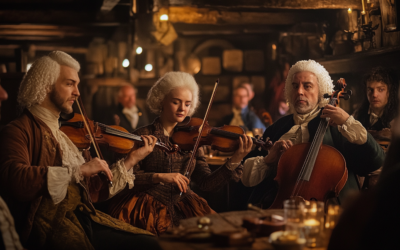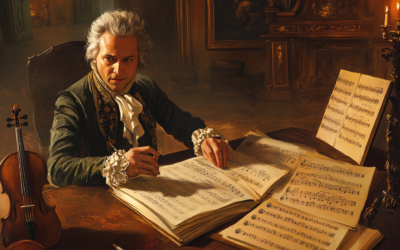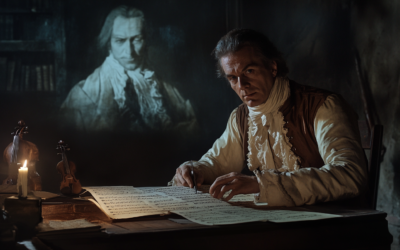The 1931 Festival and Its Legacy
Mozart and the Nationalist Illusion
The 1931 Mozart Festival, meant to celebrate the composer’s 175th anniversary, became a platform for nationalist propaganda. Beneath the guise of universalism and cosmopolitanism, Mozart’s music was used to reinforce German cultural supremacy. Erich Schenk and his fellow Nazi-aligned musicologists manipulated Mozart’s legacy, sidelining Jewish scholars like Alfred Einstein, and shaping a narrative of racial superiority in the arts.
Mozart: The Fall of the Gods
This book compiles the results of our studies on 18th-century music and Mozart, who has been revered for over two centuries as a deity. We dismantle the baseless cult of Mozart and strip away the clichés that falsely present him as a natural genius, revealing the contradictions in conventional biographies. In this work, divided into two parts, we identify and critically analyze several contradictory points in the vast Mozart bibliography. Each of the nearly 2,000 citations is meticulously sourced, allowing readers to verify the findings. This critical biography of Mozart emerges from these premises, addressing the numerous doubts raised by researchers.
"By parodying the works of foreign musicians, Mozart vented his anger and disdain for the frivolous, insipid music that foreign composers could use to win fame and fortune."
A. Einstein
The 175th anniversary of Mozart’s birth in 1931 was the long-awaited moment for a national resurgence, using his music to foster a sense of unity in a country struggling with internal divides. The celebrations, however, were marked by a troubling juxtaposition: amidst the anti-Semitic chants of the Spielschar Ekkehard and the performance of Mozart’s Lieder in the streets, there was a forced attempt to keep national pride alive.
During the 1931 Festival, Mozart’s music was draped in internationalism, cosmopolitanism, and universalism—terms that barely concealed the underlying focus on Germany. His work, hailed as “timeless,” was described as übernational (supranational), a label intended to elevate it above mere internationalism. In truth, this framing served to reinforce the idea that Mozart’s art was a reflection of the uniquely profound and privileged German spirit, which, it was claimed, was the only culture capable of attaining the absolute in the art of sound.
The supposed cosmopolitanism of Mozart, as framed by figures like Guido Adler, the father of German musicology, and Robert Hirschfeld, rings ironically hollow. For them, and later for Arnold Schoenberg, Heinrich Schenker, and Paul Hindemith, the achievements of so-called “pure music” were proof of a transcendent universality—one that conveniently remained confined to German culture. This paradox reached its peak when, in 1941, the Nazis celebrated Mozart’s jubilee in Vienna, with fervent support from Richard Strauss, Wilhelm Furtwängler, and the entire German musicological community. As the great “Aryan” Mozart was honored, exiled composers like Kurt Weill and Schoenberg in America claimed themselves, not the Nazis, to be the rightful heirs of Mozart’s legacy.
In 1931, Alfred Einstein published Don Giovanni for Eulenburg Editions in Leipzig, hoping in his preface that this work would inspire “a new spiritual sense of music” and serve as a guide for the Germans to distance themselves from the philosophical interference of non-musical thinkers. Einstein’s optimism proved misplaced. The academic establishment, influenced by the anti-Semitic philosophies of the time, eventually denied him academic opportunities.
That same year, Oscar von Pander, writing for Münchner neueste Nachrichten, echoed the idea of Mozart’s unmatched purity and precision, despite the composer’s output spanning over sixty different styles. Pander cited works such as the Jupiter Symphony K.551 and the Ave Verum K.618, but ignored Mozart’s stylistic inconsistencies, promoting him as the ideal model for German composers in the midst of an economic crisis.
The 1931 congress of musicologists, held in Vienna during the celebrations, became the most significant musical event of its time, gathering Austria and Germany’s top minds to discuss the ultra-nationalist themes of the day: anti-Semitism, racial superiority, Mozart’s troubled relationship with Freemasonry, the national identity of opera, and the extent of German influence in his music. Erich Schenk, a prominent Salzburg musicologist, played a key role in organizing the event. Schenk deliberately ignored Einstein’s contributions, including his recent edition of Don Giovanni and his work on the Köchel catalog, because Einstein was of Jewish descent.
Schenk’s rise to prominence coincided with his support for Nazi ideology. After his studies in Salzburg, Munich, Vienna, and Berlin, he became a lecturer at the University of Rostock, aligning himself with the Grossdeutsche Volkspartei, which advocated for the union of Austria and Germany. When the Nazis came to power, Schenk’s loyalty was rewarded, allowing him to secure prestigious academic positions. After the Anschluss, he was appointed professor of musicology at the University of Vienna, where he trained the next generation of musicologists. He resurrected the xenophobic Mozart Studies (Mozartianische Studien) journals, first published by Hermann Abert, a nationalist biographer of Mozart.
Schenk’s career was marked by virulent anti-Semitism, which he practiced from the early 1930s until his death. He joined several Nazi organizations, including the NS-Lehrerbund (National Socialist Teachers League) and the NS-Dozentenbund (National Socialist University Lecturers League). He also worked as a temporary employee for Rosenberg’s intelligence office, providing information on Jewish students in the musicology department, many of whom disappeared or were forced to emigrate. Schenk contributed to Herbert Gerigk’s Lexicon of Jews in Music, a notorious Nazi publication, with the hope that it would help uncover more Jews to send to the concentration camps.
After the war, Schenk’s collaboration with the Nazi regime did not impede his career. He continued to hold his position at the Austrian Academy of Sciences, became Dean of the Faculty of Philosophy in 1950, and Rector of the University of Vienna in 1957. His nationalist ideals persisted, influencing his contributions to the Denkmäler der Tonkunst in Österreich, a collection of Austrian classical music, where he reinforced the German-centric division of the Baroque era, strategically ignoring composers like Scarlatti, whom the Nazis labeled as of “mixed or bastard race.”
Schenk’s legacy continues today, with the Mozart Society in Vienna awarding the Erich-Schenk-Preis annually to researchers who follow in his footsteps. His nationalist interpretation of Mozart lives on, casting a long shadow over musicology.
You May Also Like
The Uncertain Origins of Mozart’s Early String Quartets
Mozart’s so-called “Milanese Quartets” (K.155, 158, and 159) have long been subject to debate, primarily due to their ambiguous instrumentation and structural weaknesses. Were these works part of a larger series of orchestral divertimenti, hastily repurposed as string quartets? The answer remains elusive, reflecting the young composer’s struggles to find his own voice.
Mozart’s Quartet of Lodi: A Dated Work with Many Influences
Mozart’s Quartet of Lodi is often praised as an early masterpiece. But was it really his own work?
The Hidden Influence of Joseph Boulogne, Chevalier de Saint-George
Joseph Boulogne, known as the “Black Mozart”, was shaping the future of music while Mozart was still struggling for recognition in Paris. But history has buried the significant influence Saint-George had on Mozart’s career, erasing his pioneering style from the narrative.
Mozart’s Violin Pieces: Substitutes for Failed Movements?
Despite revisions, Mozart’s violin concertos remain flawed, while his minor pieces, K.261 and K.373, surprisingly garner more attention in his correspondence than his major works.
The Questionable Origins of Mozart’s Violin Concertos
Are Mozart’s violin concertos truly original? This article explores the possibility that the Czech composer Josef Mysliveček played a far larger role in their creation than previously acknowledged.
The Kolb Concerto: A Mozartian Mirage?
The Kolb Concerto’s dubious origin and poor musical quality expose yet another myth in the Mozartian canon. If this is the work of a genius, then perhaps we’ve been fooled for centuries.







